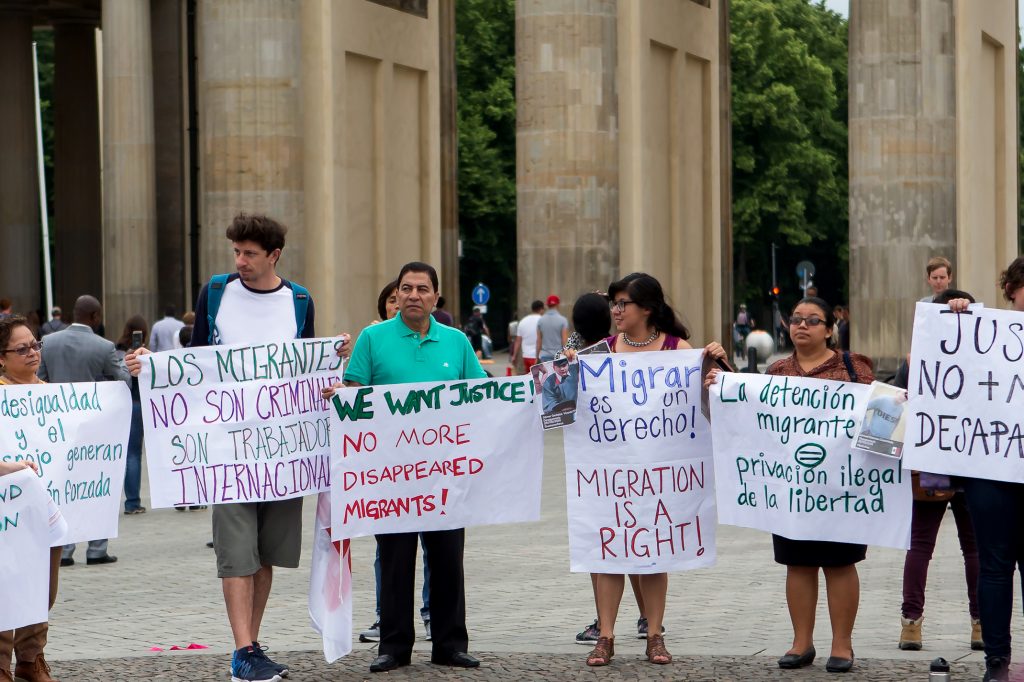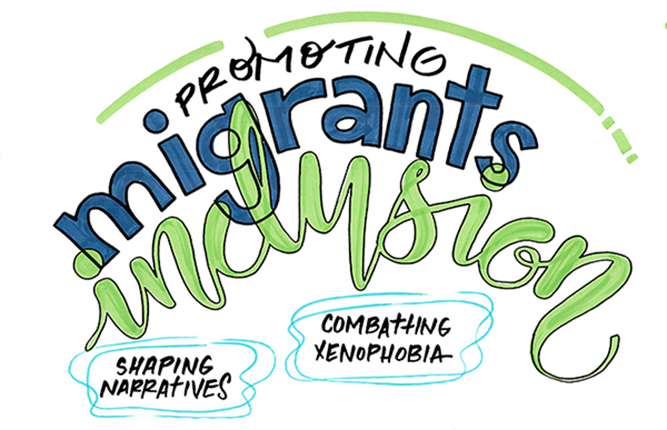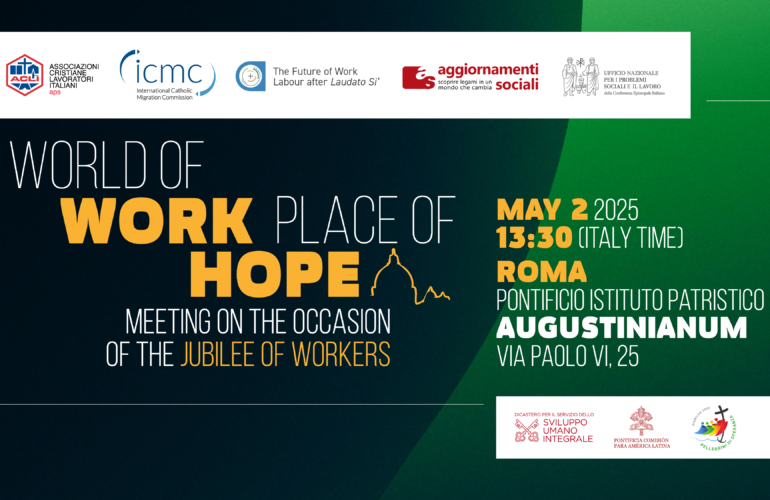ICMC advocates for international and national legislations that protect migrants’ rights and safeguard the wellbeing of host communities. In particular, ICMC advocacy focuses on the implementation of the Global Compact for Safe, Orderly and Regular Migration. It works with other civil society organizations in monitoring how governments and other stakeholders implement their commitments.
Adopted by over 150 States in December 2018, the Global Compact for Safe, Orderly and Regular Migration is a milestone document addressing all dimensions of international migration in a holistic and comprehensive way. As the first international agreement of its kind, the Compact, if implemented in good faith, has the potential to bring about concrete changes with lasting impact for migrants and host communities
States have committed to fulfill the objectives and commitments set in the Compact, taking into account different national realities and capacities, and in cooperation with migrants themselves, civil society organizations and other relevant stakeholders.
Together with dozens of civil society organizations from across the world, ICMC has consistently advocated for a Global Compact for Migration, which is a living document and which does its job properly.

The proactive engagement of the Civil Society Action Committee, co-coordinated by ICMC, led to the inclusion in the Compact of, among others aspects, better protection measures for vulnerable migrants such as children, people with disabilities and women; work regulations that respect migrants’ dignity; and the prioritization of alternatives to detention for irregular migrants.
Implementation Is the Moment of Truth
After the adoption of the Global Compact for Migration, the focus of ICMC’s advocacy has switched to monitoring its implementation and pushing for its commitments to become a reality. To do that, ICMC engages with States, local authorities, UN agencies, civil society organizations and the private sector.
ICMC believes that to truly improve the situation of migrants across the world, it is crucial to engage all governments, including those which unfortunately have not adopted the Compact.
ICMC together with other civil society organizations urge governments to swiftly implement a number of key commitments included in the Global Compact for Migration:
- protect vulnerable migrants, especially children;
- only use immigration detention as a last resort, and never for children;
- increase safe and regular migration pathways;
- ensure decent living conditions and safe access to services, such as education, healthcare and housing;
- respect human rights under all circumstances, including during procedures to return migrants to their country of origin;
- guarantee labor rights;
- promote and implement gender-responsive policies.
- priority should also be given to investing in sustainable development and tackling the drivers of forced migration.
Access to services for all migrants, regardless of their migration status (whether regular or irregular), is a key point that ICMC constantly raises with governments.
The implementation phase is a crucial and delicate moment, which can ‘make or break’ the Global Compact. A fast and genuine delivery on commitments, coupled with regular monitoring by inter alia civil society organizations, is a clear demand of ICMC and its partner civil society organizations.
Taking Advantage of Existing Spaces
The Global Forum for Migration and Development (GFMD), where ICMC coordinates the participation of civil society organizations, has proven to be a useful space to advance the demands of civil society and engage governments. It provides a platform where civil society organizations can directly talk with governments’ representatives, in an informal setting.
The Forum is a government-led process that brings together States, city mayors, business representatives, and civil society organizations concerned with migration and development issues. Its goal is to discuss sensitive topics, propose innovative solutions, and share policies and practices.
The GFMD has an important role as a ‘laboratory’ and had a paramount role in facilitating discussions which eventually led to the adoption of the Global Compact for Migration.
In the latest annual GFMD Summit, which took place in Quito (Ecuador) in January 2020, civil society organizations brought a number of topics to the fore of the discussions, including criminalization of migrants and of civil society organizations working with migrants, non-discriminatory access to services by irregular migrants and the reality of mixed migration.
Against Xenophobia and Criminalizing Language
ICMC strongly advocates for a return to ‘basic human decency’ and a rejection of the xenophobic language and practices which have spread around the world. Importantly, the Global Compact for Migration does indeed offer an alternative, using a responsible narrative that takes both opportunities and challenges into account, but also presents migrants in all their humanity.
Governments must be consistent, determined and uncompromising in their fight against xenophobia. Addressing stereotypes that often surround migration is a non-negotiable condition to ensure that the commitments of the Global Compact become a reality.
ICMC also calls to reject the criminalization of migrants and migration in general, and of those engaged in work with migrants.

Recommendations for a Successful Implementation
The Global Compact for Migration provides technical guidance and a cooperative framework for the implementation of existing legal commitments. It mobilizes resources to support States and it aims at saving lives and upholding human rights.
ICMC President Dr. Anne T. Gallagher has proposed the following benchmarks as indispensable to evaluate the advance of the Global Compact for Migration. For each aspect, there is a clear role for civil society to step in and support governments with its expertise.
- An increased understanding of the ‘hows’ and ‘whys’ of migration. This involves a more transparent collection and sharing of data, which allows for evidence-based decisions on migration policies.
- Better integration policies to provide migrants with more secure and stable futures, taking into account the length of displacement periods and offering real alternatives to displaced people.
- Reducing drastically the use of detention, with instead a stronger emphasis on alternatives to detention, which exists and have already proven to work better.
- Better labor migration policies, which provide migrant workers with the protection they need and guarantee their ability to access services, on a par with other workers.
Challenges Moving Forward
The Global Compact for Migration is an agreement that has the potential to transform the way the international community cooperates in order to better harness the benefits of migration. It puts forward a strong vision for international cooperation to benefit everyone, including migrants, the communities hosting them, and governments themselves.
However, a number of challenges remain. The non-binding nature of the Global Compact means that it does not impose any additional legal obligations on States. And during the negotiations, several States referred to the Compact as a ‘menu of options’, indicating that they plan to implement it according to their national priorities. Finally, the modalities for its implementation, follow-up and review do not contemplate any form of accountability.
These are aspects in which the engagement of civil society organizations is crucial. They often are the first — and at times only — responders providing vital services to the migrants most in need. Thus they are uniquely placed to ensure that the Global Compact translates into comprehensive responses that place individuals at their core.
Civil society organizations need to remain engaged and connected to push for an ambitious and rights-based implementation at all levels. Civil society has a role as an important agenda-setter, at national and regional levels, but also in the discussions around the UN Network on Migration, its working groups and the capacity building mechanism. The voice of civil society organizations is vital in all stocktaking, review and follow-up steps for the Global Compact for Migration.
ICMC will remain engaged in its advocacy efforts to ensure that the Global Compact for Safe, Orderly and Regular Migration has concrete beneficial effects on the ground.



